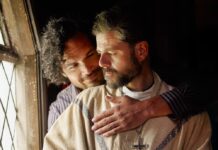Gareth Watkins highlights significant August dates from Aotearoa’s rainbow history.
28 August 1954
Teenagers Pauline Parker and Juliet Hulme were found guilty of murdering Parker’s mother with a brick in Victoria Park, Christchurch. The trial highlighted the girls’ fantasies and absorption with each other. Defence lawyers contended that the pair had a shared psychotic disorder (folie a deux), with one of the symptoms being homosexuality. However, psychiatrist, Kenneth Stallworthy told the court that even though they had “engaged in some form of physical homosexuality… homosexuality [was not] any indication of insanity.” The pair were too young to be sentenced to death and so were jailed. After 5 years they were released and both relocated separately to the United Kingdom. Reflecting on the case, academic Alison Laurie noted that the attention given to lesbian relationships in the “very negative context of murder and of young girls out of control, [had] a big impact on how that generation of lesbians and their parents began to think about relationships between girls and women.”
21 August 1986
The LGBT Bay Area Reporter newspaper in San Francisco published a profile interview with Terry and Marge. Both were born in the 1920s and had immigrated to the US as war brides – Terry from Germany and Marge from Auckland, New Zealand. At the time of the interview, they had been living together for 3 years in a straight “sister-like relationship.” Asked about her opinion of gay people in earlier times, Marge replied “I looked upon them as fairies. I thought they were crazy.” But now both women happily volunteered together in local Freedom Day [Pride] Parades. Remembering her first parade, Marge recalled “When we turned the corner … I took my deep breath and was thrilled to death – and danced all the way up Market Street.”
21 August 2003
The Broadcasting Standards Authority decided not to uphold a complaint against TVNZ for censoring music videos involving same-sex affection. The public broadcaster justified the removal of same-sex kisses because the videos were being shown in the daytime to a younger audience and, in the case of Christina Aguilera’s Beautiful, the decision was due to “the intensity of the kissing in which it was clear that there was an intertwining of tongues between the two men involved.” One of the complainants, New Zealand Young Labour, labelled the censorship as “active discrimination.” Another complainant, Tony Milne, stated “Your station is contributing [to] the marginalisation of same-sex people and displays of affection. Your station, by omitting same-sex displays of affection, is contributing to making young gay people invisible yet again.”
6 August 2007
The New Zealand AIDS Foundation announced an increase of over 200% in the number of people testing for HIV since the introduction of a new rapid HIV test. People were now able to receive results in 20 minutes. NZAF Positive Health Manager Eamonn Smythe said that many people using the tests had never been tested before, “Some of these people had been deterred from testing previously by the anxiety of having to wait up to a week for results from a blood test.” Rapid testing began in Auckland in December 2006 and was then rolled out to Hamilton, Christchurch and Wellington. Nowadays, rapid tests can give results for both HIV and syphilis in a minute.
29 August 2012
A large crowd gathered in Wellington’s Civic Square to march in support of marriage equality. Joseph Habgood, co-founder of LegaliseLove told the crowd, “We can all march today in the warm glow of knowledge that New Zealand is with us. The vast majority agree that love is love.” Another group that supported marriage equality was The Queer Avengers. However, they also wanted to stress “that marriage equality is not the end of [the] line for LGBT rights and that struggles beyond marriage lie ahead.” In a press release, Queer Avenger Sara Fraser pointed out that rainbow communities still faced many obstacles including queer youth bullying, suicide and homelessness, inadequate access to quality health care for trans people and common intimidation and violence in the streets. Fraser reiterated, “this is not the final struggle.”
Photo | Marriage Equality March in Wellington by Steph Upchurch.

















